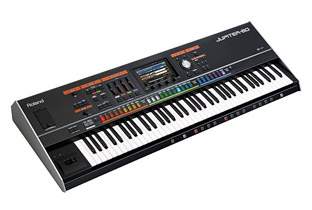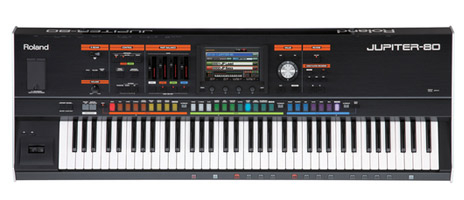Published
Tue, May 17, 2011, 13:15
- Was Roland's decision to revive their revered Jupiter range a sound one?

Roland's Jupiter 80 was, without question, the product which prompted the most discussion at this year's Musikmesse. Roland, as a company, certainly carry enough weight to make any new flagship synth a serious talking point but it's the name of this particular instrument which has led to discussion forums approaching meltdown.
Roland's recent product line has been littered with references to past classics, with the SH-01 (Gaia), SH-201 and now the Jupiter 80 hinting at—but not really delivering—the synths we devotees seem to crave. The original Jupiter-8 (and its rackmount MKS-80 equivalent) fetch serious sums when sold second-hand. This is because they've entered the canon of classic analogue instruments which offer a sound which remains in demand today. So the Jupiter 80, before its specs were unveiled, had plenty of us wondering whether Roland might have built a true analogue synth for the 21st century. Sure, it would undoubtedly feature some modern twists, but fundamentally it would draw on a proud analogue tradition, right?
Wrong. Instead, the Jupiter 80 features SuperNatural technology which is capable of producing phenomenally "real" sounding emulations of acoustic instruments, with advanced performance features to make this a powerful studio and stage synth. At the root of SuperNatural is a large database of sampled sounds and in this sense, the Jupiter 80 appears to draw on the legacy of Roland's S+S (sample and synthesis) instruments of the late '80s including the ground-breaking D-50.
Roland's justification for calling this instrument a Jupiter is based on the idea that the original Jupiter-8 utilised the most cutting-edge technology available at the time and the Jupiter 80 does the same thing a few decades later. Is this enough to warrant such a classic name, though? Roland are clearly and understandably excited about the Jupiter 80 and it strikes me that those young enough not to remember the Jupiter 8—and who have deep pockets—might be as well; after all, this is clearly a powerful new instrument.
 In last week's column I suggested a few ways in which it's possible to build a fanbase. This week it seems almost apt to suggest that Roland might have seriously damaged their own by calling this instrument a Jupiter. Whenever a band, artist, record label, music label or even instrument manufacturer makes a move which suggests it views its own past and reputation differently from its fans, there's always likely to be a vocal group of dissenters. We've probably all bought albums by artists we once loved to discover their creative ideas have run dry. Equally, there are also plenty of niche labels who have had to popularize their output to survive, much to the chagrin of those who were supportive of that label's original approach.
Roland run the same risk here by tagging this instrument a Jupiter. And I'm actually willing to bet that with the Jupiter name back in circulation to its current extent, that the price of second-hand Jupiter 8s will rise further and for those unable to afford such a purchase, more attention will be paid to clones such as Arturia's great-sounding Jupiter 8V. Both of these things might well come at the expense of people queuing up to buy the Jupiter 80.
So, do names matter? Yes, in this context, they represent brands. Punters have expectations of the kinds of products certain companies will produce and, when those expectations are met, devotion levels rise yet higher. One only has to look at the past 15 years of Apple's history to see what happens when technology meets and exceeds public expectations.
In last week's column I suggested a few ways in which it's possible to build a fanbase. This week it seems almost apt to suggest that Roland might have seriously damaged their own by calling this instrument a Jupiter. Whenever a band, artist, record label, music label or even instrument manufacturer makes a move which suggests it views its own past and reputation differently from its fans, there's always likely to be a vocal group of dissenters. We've probably all bought albums by artists we once loved to discover their creative ideas have run dry. Equally, there are also plenty of niche labels who have had to popularize their output to survive, much to the chagrin of those who were supportive of that label's original approach.
Roland run the same risk here by tagging this instrument a Jupiter. And I'm actually willing to bet that with the Jupiter name back in circulation to its current extent, that the price of second-hand Jupiter 8s will rise further and for those unable to afford such a purchase, more attention will be paid to clones such as Arturia's great-sounding Jupiter 8V. Both of these things might well come at the expense of people queuing up to buy the Jupiter 80.
So, do names matter? Yes, in this context, they represent brands. Punters have expectations of the kinds of products certain companies will produce and, when those expectations are met, devotion levels rise yet higher. One only has to look at the past 15 years of Apple's history to see what happens when technology meets and exceeds public expectations.
 In last week's column I suggested a few ways in which it's possible to build a fanbase. This week it seems almost apt to suggest that Roland might have seriously damaged their own by calling this instrument a Jupiter. Whenever a band, artist, record label, music label or even instrument manufacturer makes a move which suggests it views its own past and reputation differently from its fans, there's always likely to be a vocal group of dissenters. We've probably all bought albums by artists we once loved to discover their creative ideas have run dry. Equally, there are also plenty of niche labels who have had to popularize their output to survive, much to the chagrin of those who were supportive of that label's original approach.
Roland run the same risk here by tagging this instrument a Jupiter. And I'm actually willing to bet that with the Jupiter name back in circulation to its current extent, that the price of second-hand Jupiter 8s will rise further and for those unable to afford such a purchase, more attention will be paid to clones such as Arturia's great-sounding Jupiter 8V. Both of these things might well come at the expense of people queuing up to buy the Jupiter 80.
So, do names matter? Yes, in this context, they represent brands. Punters have expectations of the kinds of products certain companies will produce and, when those expectations are met, devotion levels rise yet higher. One only has to look at the past 15 years of Apple's history to see what happens when technology meets and exceeds public expectations.
In last week's column I suggested a few ways in which it's possible to build a fanbase. This week it seems almost apt to suggest that Roland might have seriously damaged their own by calling this instrument a Jupiter. Whenever a band, artist, record label, music label or even instrument manufacturer makes a move which suggests it views its own past and reputation differently from its fans, there's always likely to be a vocal group of dissenters. We've probably all bought albums by artists we once loved to discover their creative ideas have run dry. Equally, there are also plenty of niche labels who have had to popularize their output to survive, much to the chagrin of those who were supportive of that label's original approach.
Roland run the same risk here by tagging this instrument a Jupiter. And I'm actually willing to bet that with the Jupiter name back in circulation to its current extent, that the price of second-hand Jupiter 8s will rise further and for those unable to afford such a purchase, more attention will be paid to clones such as Arturia's great-sounding Jupiter 8V. Both of these things might well come at the expense of people queuing up to buy the Jupiter 80.
So, do names matter? Yes, in this context, they represent brands. Punters have expectations of the kinds of products certain companies will produce and, when those expectations are met, devotion levels rise yet higher. One only has to look at the past 15 years of Apple's history to see what happens when technology meets and exceeds public expectations.